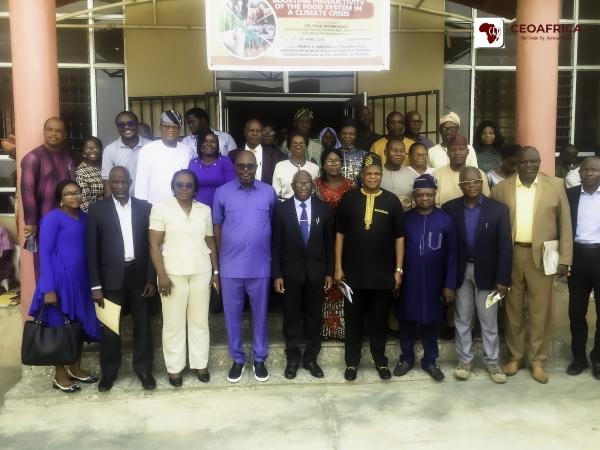
The Central Bank of Nigeria (CBN) has maintained official interbank interest rate at 14 per cent; citing recent economic indicators are supporting variables behind the decision.
Rising from its 2-day meeting yesterday, Monetary Policy Committee (MPC) of the apex bank also retained the CRR at 22.5 per cent and Liquidity Ratio at 30.00 per cent. The committee also retained the Asymmetric corridor at +200 and -500 basis points around the MPR.
‘‘The committee in consideration of the headwinds in the domestic economy and the uncertainties in the global environment, decided by 9 out of 10 members to retain the MPR at 14.0 per cent alongside all other policy parameters,’’ the CBN governor, Mr. Godwin Emefiele said yesterday while addressing reporters at the end of the meeting in Abuja. One member voted to reduce the MPR.
The MPC increased the Monetary Policy Rate (MPR) by 200 basis – points from 12 to 14 in July last year and has refused to reduce it since then.
Giving reasons for the retention, the MPC pointed to the fact that headline inflation (year-on-year), declined for the first time in 15 months, dropping by 0.94 percentage point to 17.78 per cent in February, from the 18.72 per cent recorded in January 2017, and 18.55 per cent in December, 2016 seemingly reversing the monthly upward momentum recorded since January, 2016 within the same period the bank retained the MPR at 14 per cent.
He said the moderation in headline inflation in February, 2017 reflected base effect as well as decline in the core component, which fell by 1.90 percentage points from 17.90 per cent in January to 16.0 per cent in February, 2017.
Calling for speedy implementation of the federal government’s economic recovery and growth plan, Emefiele said the Committee remains of the conviction that fiscal policy remained the most potent panacea to most of the key negative undercurrents i.e. stunted economic activity, heightened unemployment and high inflation bedeviling the economy.
“The Committee expressed satisfaction on the release of the Economic Recovery and Growth Plan, and urged its speedy implementation with clear timelines and deliverables. On the strength of these developments, the Committee felt inclined to maintain a hold on all policy parameters,” Emefiele said.
“The Committee expects that the implementation of this plan, the new foreign exchange policy as well as the current effort by the Federal Government to restore peace in the Niger Delta region would help revive economic growth and stabilize prices,” he added.
The governor was vehement that available data and forecasts of key economic variables as well as the newly released Federal Government’s Economic Recovery and Growth Plan (ERGP) combine to indicate prospects of output recovery in 2017.
In the communiqué that was issued at the end of the meeting, the Committee expressed optimism that the adopted policy stance and other ancillary measures directed at improving the agricultural and other relevant sectors of the economy would combine to restart growth and drive down prices in the short to medium-term.
Meanwhile, commenting on the MPC decision yesterday, analysts said if the decline in inflation rate continues and the economy improves in coming months, the monetary policy will have to adopt an accommodative policy.
The Minister of Finance had earlier in the year, just before the first MPC meeting or the year expressed a desire for the committee to cut rates I order to make credit cheaper for real sector operators who had since last year been calling for a cut in benchmark interest rate.
According to the managing director and chief executive of Financial Derivatives Company Limited, Bismarck Rewane, the CBN’s capacity to reduce interest rates in the near future will hinge on several factors including the GDP growth figures for the first quarter of 2017, headline inflation in March and April, crude oil production and the exchange rate.
Inflation had fallen in February this year for the first time in 15 months dropping to 17.78 per cent from 18.72 per cent in January and is anticipated to further decline in coming months. The value of the naira at the interbank market had weakened slightly to N307 to the dollar but had been gathering strength at the parallel market rising from an all-time low of N500 to the dollar to N430 yesterday.
Bismarck noted further that the implementation of the Economic Recovery and Growth Plan (ERGP), alongside increased borrowing, will likely stimulate economic activity and be complemented by an accommodative stance on the part of the monetary policy makers.
On his part, an analyst with FXTM, Lukman Otunuga said the fact that the CBN “decided to keep monetary policy unchanged should be no surprise especially when factoring how the nation is in the process of a critical structural transformation.
“Although the lingering fears decelerating economic growth and concerns over surging prices have partially attributed to the Central Bank’s passive stance, the overall sentiment towards the nation continues to display early signs of improvement.
Some optimism exists over the nation’s recovery, with Nigeria’s inflation declining for the first time in 15 months in February and the noticeable increase in Dollar sales for importers bolstering the Naira on the black market exchange. If economic data continues to follow a positive path in the long term and inflation cools then there is a possibility of the Central Bank cutting interest rates to stimulate growth” he stated.
Leadership





















